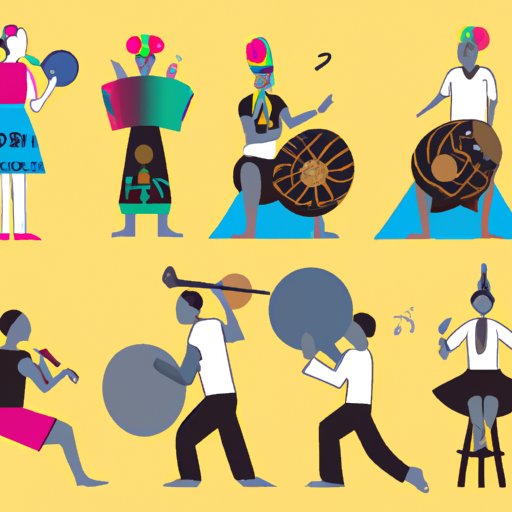Introduction
Folk culture is a term used to describe the traditional beliefs, customs, practices, and values that are shared by members of a particular community or society. It is an important element of many cultures around the world, and is often passed down from generation to generation.
The origins and development of folk culture can be traced back thousands of years. It is believed to have been shaped by the social, political, environmental, and economic conditions of the time. As these conditions changed, so did the nature of folk culture.
Investigating the Different Aspects of Folk Culture
Folk culture encompasses a wide range of activities, including music, art, literature, and everyday life. Music is an important part of folk culture, as it provides a form of expression for the community. Traditional songs, dances, instruments, and musical styles all serve to preserve the culture and provide a connection to the past.
Art is also an important aspect of folk culture. Traditional art forms such as painting, sculpture, and pottery often reflect the values and beliefs of the community. These works can provide insight into the cultural history of the area and help to preserve the traditions of the past.
Literature is another aspect of folk culture. Folk tales, myths, and legends often contain lessons about morality and provide a window into the lives of those who lived in the past. These stories can help to keep alive the culture and values of the community.
Finally, folk culture is reflected in everyday life. The customs and rituals of a society are often based on its traditional values and beliefs. These practices can include religious ceremonies, marriage customs, and dietary restrictions. By understanding and preserving these traditions, we can gain a better understanding of the culture and its importance to the community.

Investigating the Influence of Folk Culture on Society Today
Folk culture has had a profound impact on modern culture and society. For example, some traditional music and art forms have been adapted and incorporated into popular culture. Additionally, traditional stories and myths have been adapted into books, films, and other forms of entertainment.
Folk culture has also played an important role in globalization. As people have moved around the world, they have brought with them their own traditions and customs. This has resulted in a blending of cultures, which has enriched our global society. As anthropologist Edward Tylor once said, “Culture, or civilization, taken in its broad, ethnographic sense, is that complex whole which includes knowledge, belief, art, morals, law, custom, and any other capabilities and habits acquired by man as a member of society.”

Analysing the Role of Folk Culture in Local Communities
Folk culture is an important part of many local communities. It helps to define the identity of the community and gives it an individual character. Folk culture is often preserved through music, art, literature, and everyday customs.
In many areas, folk culture is actively preserved by local organizations and individuals. They may organize festivals, concerts, and other events to celebrate the culture and pass it on to future generations. Additionally, museums and libraries often house collections of folk art and literature, which can be used to educate people about the culture.
Conclusion
Folk culture is an important part of many societies around the world. It is reflective of the values, beliefs, and customs of the community and can provide insight into the culture’s history and evolution. Additionally, folk culture has had a significant impact on modern culture and society, and has played an important role in globalization. Finally, folk culture is actively preserved in many local communities, providing them with a unique identity and helping to ensure that the culture is not lost.
Folk culture is an integral part of many cultures and societies, and is something that should be celebrated and preserved. By understanding and appreciating the culture, we can gain a greater appreciation for our own heritage and the heritage of others.
(Note: Is this article not meeting your expectations? Do you have knowledge or insights to share? Unlock new opportunities and expand your reach by joining our authors team. Click Registration to join us and share your expertise with our readers.)
